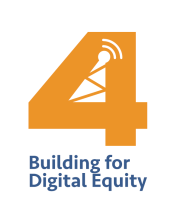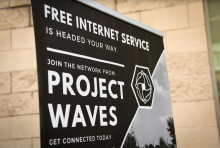
Fast, affordable Internet access for all.


This week on the podcast, Christopher speaks with Joshua Edmonds, CEO of DigitalC, a nonprofit technology social enterprise in Cleveland. DigitalC offers affordable wireless service for $18/month, as well as a co-working and collaboration space for the community.
Joshua served as Detroit’s Digital Inclusion Director for four years before heading DigitalC, and he and Christopher discuss Joshua's coalition-building work in Detroit. They compare his experience working under the city of Detroit to his nonprofit digital equity work in Cleveland. Detroit and Cleveland also have two of the highest Affordable Connectivity Program (ACP) enrollment rates among prominent metro areas – Joshua offers his approach to ACP, outlining the organized and relentless campaign it took to achieve substantial enrollment in the subsidy program during his time in Detroit. He highlights how important it is to focus on long-term, structural solutions for closing the digital divide at the same time as we find ways to make Internet more affordable in the short term.
Joshua also speaks about DigitalC’s focus on being locally-rooted, mission-driven and sustainable, and offers his thoughts on the viability of wireless.
This show is 28 minutes long and can be played on this page or via Apple Podcasts or the tool of your choice using this feed.
Transcript below.
We want your feedback and suggestions for the show-please e-mail us or leave a comment below.
Listen to other episodes here or view all episodes in our index. See other podcasts from the Institute for Local Self-Reliance here.
Thanks to Arne Huseby for the music. The song is Warm Duck Shuffle and is licensed under a Creative Commons Attribution (3.0) license.

This week on the podcast, Christopher is joined by Kevin Shendo, Education Director at the Pueblo of Jemez Department of Education, and Angela Diakah, Network Operations Supervisor at Jemez Pueblo Tribal Network (JPTN). JPTN is a wireless network serving more than 500 households in the Jemez Pueblo north of Albuquerque. Kevin and Angela share the origins of the network, spurred in part by prior serve from Windstream that was costing households on average $100/month for 4/1Mbps service.
Angela shares the story of her first install and then Kevin walks Christopher through how the Tribe currently subsidizes the entire cost of the network with the help of federal dollars, and the plan for shifting to a traditional subscription service model subsidized at the household level by the Affordable Connectivity Program. Finally, Angela shares some of the network's digital equity and inclusion work to make sure that every household that wants can make the fullest use of its connection.
This show is 25 minutes long and can be played on this page or via Apple Podcasts or the tool of your choice using this feed.
Transcript below.
We want your feedback and suggestions for the show-please e-mail us or leave a comment below.
Listen to other episodes here or view all episodes in our index. See other podcasts from the Institute for Local Self-Reliance here.
Thanks to Arne Huseby for the music. The song is Warm Duck Shuffle and is licensed under a Creative Commons Attribution (3.0) license.

In our first episode of this new podcast series, we wanted to queue up an interview with Margaret - Meg - Kaufer, who is President of the STEM Alliance in Westchester County, New York. We had previously spoken with Meg, as well as Yonkers Commissioner of Information Technology Bob Cacase, in episode 500 of the Community Broadband Bits podcast where they discussed their joint efforts to deliver Internet access to low-income households.
Meg updates us on those efforts on the heels of retiring the CBRS network earlier than expected. However, they have developed a replicable strategy for signing people up to the ACP and getting through the thoroughly unnecessary paperwork requirements.
This show is 22 minutes long and can be played on this page or using the podcast app of your choice with this feed.
Transcript below.
We want your feedback and suggestions for the show-please e-mail us or leave a comment below.
Listen to other episodes here or see other podcasts from the Institute for Local Self-Reliance here.
Thanks to Joseph McDade for the music. The song is On the Verge and is used per his Free-Use terms.
*This is the first installment of an occasional profile on Local Community Broadband Champions where we focus not so much on the technology, construction, and financing of a community network build, but on the personalities of the people who make it happen.
When Devin Weaver isn’t vibing at the Otto Bar or checking out the underground music scene at Metro Gallery, or even playing his bass guitar at home, the 28-year-old network engineer enjoys spending time amid the web of wires in storage closets inside low- and mixed-income apartment buildings dotting the city’s landscape.
It’s where his network design handiwork all comes together, snaking through the buildings to the routers installed in individual apartment dwellings, enabling residents to get gig speed Internet service.
That’s on par with what the regional monopoly provider Comcast offers city residents who can afford it. But in the buildings that Devin has made his technical playground, hundreds of financially-strapped households who subscribe to the fledgling community network he oversees get it for free – thanks to the philanthropy of dozens of organizations including the Internet Society Foundation, the France-Merrick Foundation, and the Digital Harbor Foundation.

Born and raised in Baltimore, Devin works for Project Waves, a non-profit organization founded in 2018 by an old high school classmate of his, Adam Bouhmad, to bring broadband to mostly low-income households in Baltimore City.
A Small, Rising Wave of Connectivity
Join us live on Friday, September 16, at 1pm ET for the latest episode of the Connect This! Show. Co-hosts Christopher Mitchell (ILSR) and Travis Carter (USI Fiber) will be joined by Deborah Simpier (Co-founder at Althea Networks, Sommelier Finance, and Gravity Bridge) and Sascha Meinrath (Palmer Chair in Telecommunications at Penn State University, Founder of X-Lab). They'll discuss the advantages of different wireless deployments (LTE vs. licensed spectrum vs. unlicensed spectrum) as compared to fiber, the present and future of distributed, member-owned networks, and more.
Email us at broadband@muninetworks.org with feedback and ideas for the show.
Subscribe to the show using this feed or find it on the Connect This! page, watch on YouTube Live, on Facebook live, or below.
Join us live on Friday, September 16, at 1pm ET for the latest episode of the Connect This! Show. Co-hosts Christopher Mitchell (ILSR) and Travis Carter (USI Fiber) will be joined by Deborah Simpier (Co-founder at Althea Networks, Sommelier Finance, and Gravity Bridge) and Sascha Meinrath (Palmer Chair in Telecommunications at Penn State University, Founder of X-Lab). They'll discuss the advantages of different wireless deployments (LTE vs. licensed spectrum vs. unlicensed spectrum) as compared to fiber, the present and future of distributed, member-owned networks, and more.
Email us at broadband@muninetworks.org with feedback and ideas for the show.
Subscribe to the show using this feed or find it on the Connect This! page, watch on YouTube Live, on Facebook live, or below.
The Tlingit and Haida Tribes will leverage $15 million in Rescue Plan funding to bring LTE-based 100 Mbps symmetrical wireless connectivity to 10,000 unserved residents in and around the city of Wrangell, located on Wrangell Island in southeast Alaska. The Internet Service Provider in charge of the buildout is the newly-launched, tribally-owned ISP Tidal Networks. The project is a pilot the tribes plan to expand to all residents of the island, and eventually to other communities in the region.
The pilot is made possible by Tlingit and Haida’s successful participation in the FCC’s Rural Tribal Priority Window, which allowed tribes to claim space on the 2.5 gigahertz spectrum band. Back in 2019, Tlingit and Haida partnered with southeast Alaska village tribes to gain access to the spectrum, and worked throughout 2021 to “discuss [Tlingit and Haida’s] broadband initiative and opportunities to partner for the broadband project.”
Utilizing Spectrum to Make Connectivity Feasible
Join us live on Thursday, June 9, at 5pm ET in the chat for the latest episode of the Connect This! Show. Co-hosts Christopher Mitchell (ILSR) and Travis Carter (USI Fiber) will be joined by Alan Fitzpatrick (Co-Founder and CEO of Open Broadband in North Carolina) and Matt Larsen (CEO of Vistabeam).
The panel will discuss the range of wireless approaches used in rural and urban areas to reach subscribers, how it competes with fixed broadband deployments using various technologies, and the advantages and challenges of it brings to the tool chest. They'll also talk about unlicensed versus licensed spectrum, Tarana, and how the federal broadband funding programs will change the landscape for fixed wireless in the near and long term.
Subscribe to the show using this feed on YouTube Live or here on Facebook Live, on find it on the Connect This! page.
Email us broadband@muninetworks.org with feedback and ideas for the show.
Watch here on YouTube Live, here on Facebook live, or below.
An effort to foster digital sovereignty and support tribal citizens to build and operate their own broadband networks in Indian Country is gaining momentum.
Responding to the challenges of COVID and the opportunities created by the federal attention and investment into tribal broadband, our own Christopher Mitchell, Director of the Community Broadband Initiative at the Institute for Local Self-Reliance, prominent Tribal broadband advocate and 20-year veteran behind the Tribal Digital Village, Matt Rantanen - along with a loose coalition of public interest tech people - have organized a series of trainings to help tribes tackle building and running networks for themselves.
These Tribal Broadband Bootcamps build on the work of Internet Society's North American chapter at an Indigenous Connectivity Summit. The first Bootcamp, held in the summer of 2021, brought together nearly two dozen tribal citizens from five indigenous nations who gathered in southern California to learn how to build and operate wireless networks using their FCC license for 2.5 GHz spectrum access. The second bootcamp, held in March 2022, focused both on wireless and fiber networks. The third bootcamp, slated for next week, will be the first on the sovereign territory of the Yurok Nation in northern California.
Tribal Connectivity Front and Center
Each bootcamp is a 3-day intensive learning experience that invites tribal citizens to come together with experienced network architects, managers, and policy experts to walk participants through what it takes to build a local broadband network, how to operate as Internet Service Providers, and handle the associated technical challenges.

This week on the podcast, Christopher is joined by Margaret Kaufer, President of the New York-based STEM Alliance, and Bob Cacase, Commissioner of Information Technology for the City of Yonkers. During the conversation, the three talk about Y-ZONE, a partnership between several community groups working to connect households in Yonkers. They discuss origins of the partnership, performance of the CBRS technology the network relies on, and some technical details of their particular build. They also get into the nitty gritty of real world costs associated with building CBRS networks, and how they overcome obstacles they have faced regarding adoption by the community.
This show is 35 minutes long and can be played on this page or via Apple Podcasts or the tool of your choice using this feed.
Transcript below.
We want your feedback and suggestions for the show-please e-mail us or leave a comment below.
Listen to other episodes here or view all episodes in our index. See other podcasts from the Institute for Local Self-Reliance here.
Thanks to Arne Huseby for the music. The song is Warm Duck Shuffle and is licensed under a Creative Commons Attribution (3.0) license.